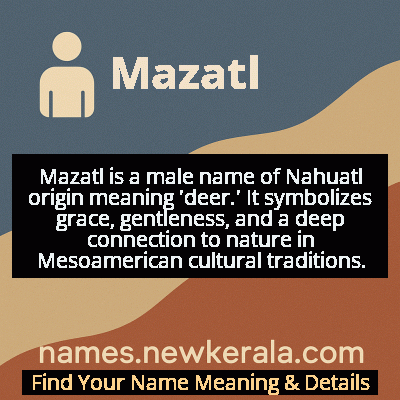Mazatl Name Meaning & Details
Origin, Popularity, Numerology Analysis & Name Meaning of Mazatl
Discover the origin, meaning, and cultural significance of the name MAZATL. Delve into its historical roots and explore the lasting impact it has had on communities and traditions.
Name
Mazatl
Gender
Male
Origin
Nahuatl
Lucky Number
1
Meaning of the Name - Mazatl
Mazatl is a male name of Nahuatl origin meaning 'deer.' It symbolizes grace, gentleness, and a deep connection to nature in Mesoamerican cultural traditions.
Mazatl - Complete Numerology Analysis
Your Numerology Number
Based on Pythagorean Numerology System
Ruling Planet
Sun
Positive Nature
Leaders, ambitious, highly driven, self-reliant, innovative.
Negative Traits
Overly aggressive, domineering, impatient, selfish.
Lucky Colours
Red, orange, gold.
Lucky Days
Sunday.
Lucky Stones
Ruby, garnet.
Harmony Numbers
2, 3, 9.
Best Suited Professions
Entrepreneurs, managers, engineers.
What People Like About You
Courage, determination, leadership.
Famous People Named Mazatl
Mazatl Tlanextic
Pre-Columbian Noble
Ruler who maintained city-state autonomy through diplomacy during Aztec expansion
Mazatl Cuahtli
Codex Artist
Indigenous scribe who helped preserve Nahuatl knowledge in the Florentine Codex
Mazatl Teocuitlatl
Modern Artist
Contemporary painter blending indigenous motifs with ecological themes
Name Variations & International Equivalents
Click on blue names to explore their detailed meanings. Gray names with will be available soon.
Cultural & Historical Significance
Extended Personality Analysis
People named Mazatl typically exhibit personality traits reflecting their deer namesake - they move through life with natural grace and quiet observation. Their gentle demeanor often masks considerable inner strength and resilience. Like deer navigating their forest habitat, Mazatl individuals possess keen situational awareness and intuitive understanding of social dynamics. They tend to be peace-loving and diplomatic, preferring to resolve conflicts through understanding rather than confrontation. Their connection to nature often manifests as environmental consciousness and appreciation for natural beauty. While generally calm and measured, they can display surprising swiftness and decisiveness when circumstances demand action. Mazatl-named people often value family and community deeply, showing protective instincts while respecting individual autonomy. Their balanced approach to life combines sensitivity with practicality, making them reliable friends and thoughtful leaders who consider multiple perspectives before acting.
Modern Usage & Popularity
In modern usage, Mazatl has transitioned from a traditional indigenous name to a symbol of cultural revival and pride. While still relatively uncommon, its usage has grown significantly since the late 20th century, particularly among Nahua communities in Mexico and Chicano populations in the United States. The name appeals to parents seeking meaningful cultural connections and distinctive names that honor indigenous heritage. It appears most frequently in regions with strong indigenous presence like central Mexico, but has spread through diaspora communities globally. Contemporary usage often reflects conscious cultural reclamation, with parents choosing Mazatl to affirm indigenous identity and resist historical erasure. The name's phonetic accessibility in multiple languages and its positive natural symbolism contribute to its growing appeal beyond strictly Nahua contexts, representing a bridge between traditional indigenous culture and modern multicultural identity.
Symbolic & Spiritual Meanings
Symbolically, Mazatl represents the elegant balance between gentleness and strength, vulnerability and resilience. The deer embodies intuitive wisdom, graceful navigation of life's challenges, and deep connection to natural cycles. Its antlers, which regenerate annually, symbolize continuous growth, renewal, and the cyclical nature of existence. In many indigenous traditions, deer serve as spiritual messengers between worlds, representing sensitivity to subtle energies and the ability to move between different realms of understanding. The deer's alertness and awareness symbolize mindfulness and living in the present moment. Contemporary symbolic interpretations emphasize ecological harmony, reminding us of our interdependence with nature. Mazatl encourages embracing one's gentle qualities as strengths rather than weaknesses, and represents the power of quiet persistence over aggressive domination in achieving meaningful goals and maintaining balanced relationships.

